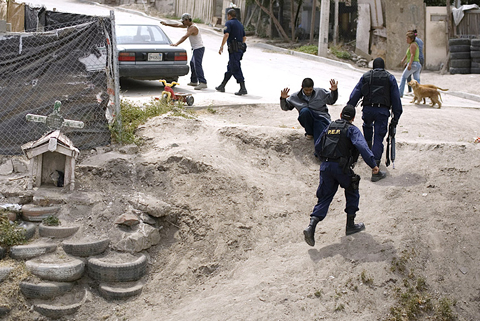Mexico has deployed 1,500 more troops to the northern border city of Ciudad Juarez, where homicides related to the drug trade have surged in recent weeks.
The resurgent bloodshed raises doubts about the government’s goal of returning law enforcement and security duties to a reconstituted Ciudad Juarez police force later this year.
The extra soldiers will begin patrolling the city Monday, said Enrique Torres Valadez, the spokesman for the joint security operation of soldiers and state police in Ciudad Juarez.

PHOTO: AP
A total of 2,500 troops arrived on Saturday night in the city across the border from El Paso, Texas, Torres said, though about 1,000 of them are relieving soldiers already on duty there.
Drug-related killings in Ciudad Juarez declined to about one per day after the army sent some 5,000 troops there in March, bringing the number of soldiers patrolling the streets to about 7,000.
As homicides declined, some troops withdrew.
But last week, the Chihuahua state attorney general’s office said killings in Ciudad Juarez have risen again to an average of eight or nine per day.
State officials haven’t given a reason for the increase.
But Victor Clark, an drug-trafficking expert based in the northern city of Tijuana, said it shows the troop deployment is not working.
While soldiers have stepped up street patrols, there has been little intelligence work aimed at capturing the top drug lords in Ciudad Juarez — or the corrupt politicians and businessmen who protect and finance them.
“I see two wars, the visible and the invisible one. The visible one is the dead that the media reports on every day, but the dead are just cheap labor,” said Clark, director of the Binational Center for Human Rights in Tijuana.
“The invisible one is ... the business class and the politicians who really benefit from the millions that the drug trade generates,” Clark said.
“The army had not carried out profound intelligence work,” he said. “In Juarez, they have not dared to touch that level of organized crime.”
Mexican President Felipe Calderon has relied heavily on the military in his frontal attack on drug trafficking, deploying more than 45,000 troops across the country to crush brutal cartels.
The offensive has led to the capture of several drug kingpins, and last month, federal agents took the battle to an unprecedented level with the arrest of 10 mayors in western Michoacan state on suspicion of protecting La Familia cartel.
So far, however, few high-profile arrests have taken place in Ciudad Juarez, even though it had about 1,600 drug-related killings last year, more than any other Mexican city. Through the middle of last month, there have been 800 killings in the city of about 1.3 million people.
Across the country, more than 10,800 people have been killed in drug violence since Calderon launched his offensive in December 2006.

Eleven people, including a former minister, were arrested in Serbia on Friday over a train station disaster in which 16 people died. The concrete canopy of the newly renovated station in the northern city of Novi Sad collapsed on Nov. 1, 2024 in a disaster widely blamed on corruption and poor oversight. It sparked a wave of student-led protests and led to the resignation of then-Serbian prime minister Milos Vucevic and the fall of his government. The public prosecutor’s office in Novi Sad opened an investigation into the accident and deaths. In February, the public prosecutor’s office for organized crime opened another probe into

RISING RACISM: A Japanese group called on China to assure safety in the country, while the Chinese embassy in Tokyo urged action against a ‘surge in xenophobia’ A Japanese woman living in China was attacked and injured by a man in a subway station in Suzhou, China, Japanese media said, hours after two Chinese men were seriously injured in violence in Tokyo. The attacks on Thursday raised concern about xenophobic sentiment in China and Japan that have been blamed for assaults in both countries. It was the third attack involving Japanese living in China since last year. In the two previous cases in China, Chinese authorities have insisted they were isolated incidents. Japanese broadcaster NHK did not identify the woman injured in Suzhou by name, but, citing the Japanese

RESTRUCTURE: Myanmar’s military has ended emergency rule and announced plans for elections in December, but critics said the move aims to entrench junta control Myanmar’s military government announced on Thursday that it was ending the state of emergency declared after it seized power in 2021 and would restructure administrative bodies to prepare for the new election at the end of the year. However, the polls planned for an unspecified date in December face serious obstacles, including a civil war raging over most of the country and pledges by opponents of the military rule to derail the election because they believe it can be neither free nor fair. Under the restructuring, Myanmar’s junta chief Min Aung Hlaing is giving up two posts, but would stay at the

YELLOW SHIRTS: Many protesters were associated with pro-royalist groups that had previously supported the ouster of Paetongtarn’s father, Thaksin, in 2006 Protesters rallied on Saturday in the Thai capital to demand the resignation of court-suspended Thai Prime Minister Paetongtarn Shinawatra and in support of the armed forces following a violent border dispute with Cambodia that killed more than three dozen people and displaced more than 260,000. Gathered at Bangkok’s Victory Monument despite soaring temperatures, many sang patriotic songs and listened to speeches denouncing Paetongtarn and her father, former Thai prime minister Thaksin Shinawatra, and voiced their backing of the country’s army, which has always retained substantial power in the Southeast Asian country. Police said there were about 2,000 protesters by mid-afternoon, although